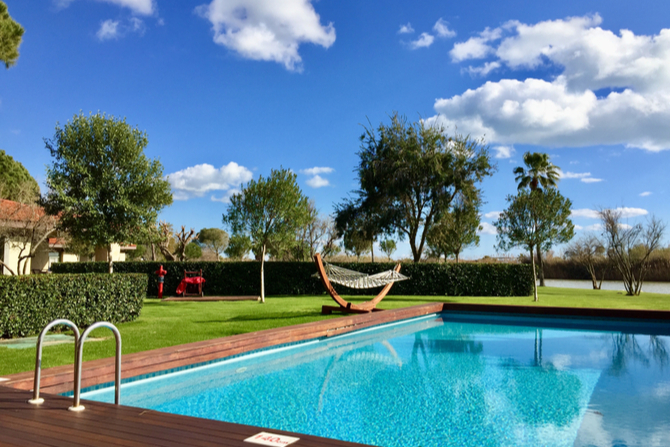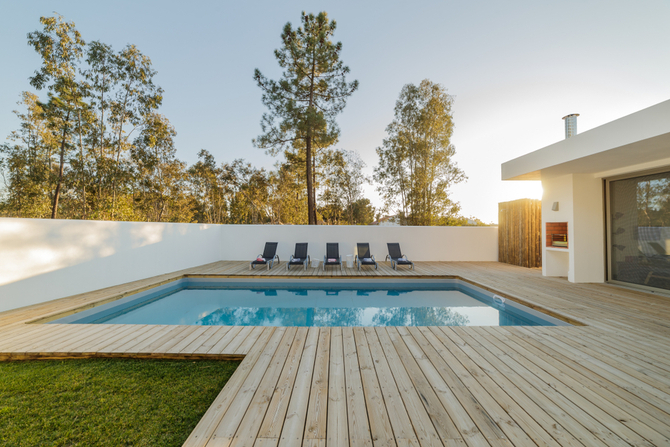Once the summer bathing season is over, the outdoor pools require maintenance until the next set-up before summer arrives. At this precise moment there are two options to hibernate: either empty the pool or leave it full by covering it to protect it.
This hibernation process for the pool is very important so that it is in good conditions for use next summer, with minimal maintenance before using it again. Whatever decision you make, you must keep the pool clean at all times, leaving it in the best conditions so that its structure remains intact.
Is it better to empty the pool or is it enough to simply cover it until next summer? we give you the best tips for maintaining a swimming pool in winter, with minimal effort and reducing financial costs.

How to prepare the pool for winter
When temperatures drop, we stop using the outdoor pool and it is time to decide what maintenance we will carry out. Is it necessary to empty it in all cases? The answer is NO, you do not have to empty the pool as long as you leave it in good condition for the winter.
We are going to see what are the two main options to maintain a pool during the winter, and what advantages and disadvantages each one offers. We also take the opportunity to recommend this post on how to maintain the garden in the fall .
empty the pool
The emptying of the pool implies the total elimination of the water that occupies it. It is an essential activity to be able to clean and disinfect the pool in depth, also taking advantage of it to repair any cracks and damage that may have occurred.
However, if the pool is in good condition and does not need repair, emptying it completely implies a waste of water and extra work that we can save ourselves.
Pool maintenance experts recommend emptying the pool only when necessary, taking advantage of the winter season to cover it and keep it in the best conditions without touching the water.
An empty pool for a long time runs the risk of cracking due to the pressure exerted by the earth on the walls. The expense in water that is carried out, due to the amount that we must use to refill it before summer, would also be another of the main reasons to keep it full by making adequate use of that water that it already contains.
cover the pool
An excellent option is to leave the pool filled during the winter, with minimal maintenance that makes the process easier. In this case, it is advisable to leave the water level at 2/3 of its usual volume, ensuring that it is clean and in good sanitary conditions.
Outside the bathing season, it is not necessary to maintain a high level of chlorine, but it is advisable to continue using the treatment plant to process the stagnant water and leave it clean. The surface, the baskets, the bottom, the skimmers and the filter of the treatment plant must be cleaned frequently, to prevent dirt from accumulating, even if we keep it covered.
As a complement during cleaning, check monthly that the pH level is adequate, adding the corresponding products to prevent the water from decomposing.
If you are going to leave the pool filled during the winter, it is important to make it a safe area when there are children or pets in the house. Because this part will be less guarded throughout the day, the risk of an accident may be greater. It would be enough to choose a pool cover that is safe. A good cover also allows us to save energy, turning off the circulation motor when not too much dirt accumulates inside.

Risks of frost for the pool
Another detail that Gilmar urges you to take into account in areas where temperatures usually drop below 0ºC during winter is frost. In this case, the frozen water in the pool could cause cracks or fissures in the surface of the pool, so it would be advisable to empty the pool.
If it is not common for the pool water to freeze in winter, but we want to avoid any risk of damage, it is possible to cushion the pressure of the ice by placing a float on the surface of the water. Any floating object that keeps moving prevents the surface of the water from freezing, avoiding that point of frost on the water that could continue to freeze the layers below.
Evaluate the advantages and disadvantages of emptying the pool or leaving it full with proper maintenance during the winter, to save time and money in those months when you will not use it. And, as a preliminary step if you want to have one, here we give you the tips to build your own pool .